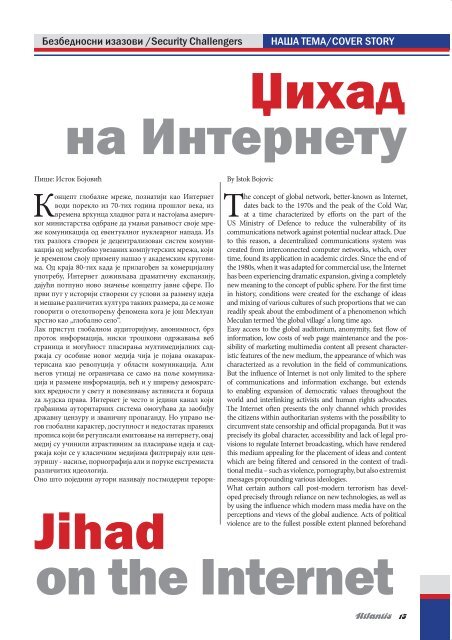"ATLANTIS" Broj 7. u PDF formatu - Atlantski savet Srbije:. Dobrodošli
"ATLANTIS" Broj 7. u PDF formatu - Atlantski savet Srbije:. Dobrodošli
"ATLANTIS" Broj 7. u PDF formatu - Atlantski savet Srbije:. Dobrodošli
Create successful ePaper yourself
Turn your PDF publications into a flip-book with our unique Google optimized e-Paper software.
����������������������������������������� ���������������������<br />
������<br />
������������<br />
Пише: Иcток Бојовић<br />
Концепт глобалне мреже, познатији као Интернет<br />
води порекло из 70-тих година прошлог века, из<br />
времена врхунца хладног рата и настојања америчког<br />
министарства одбране да умањи рањивост своје мреже<br />
комуникација од евентуалног нуклеарног напада. Из<br />
тих разлога створен је децентрализован систем комуникација<br />
од међусобно увезаних компјутерских мрежа, који<br />
је временом своју примену нашао у академским круговима.<br />
Од краја 80-тих када је прилагођен за комерцијалну<br />
употребу, Интернет доживљава драматичну експанзију,<br />
дајући потпуно ново значење концепту јавне сфере. По<br />
први пут у историји створени су услови за размену идеја<br />
и мешање различитих култура таквих размера, да се може<br />
говорити о отелотворењу феномена кога је још Меклуан<br />
крстио као „глобално село“.<br />
Лак приступ глобалном аудиторијуму, анонимност, брз<br />
проток информација, ниски трошкови одржавања веб<br />
страница и могућност пласирања мултимедијалних садржаја<br />
су особине новог медија чија је појава окакарактерисана<br />
као револуција у области комуникација. Али<br />
његов утицај не ограничава се само на поље комуникација<br />
и размене информација, већ и у ширењу демократских<br />
вредности у свету и повезивању активиста и бораца<br />
zа људска права. Интернет је често и једини канал који<br />
грађанима ауторитарних система омогућава да заобиђу<br />
државну цензуру и званичну пропаганду. Но управо његов<br />
глобални карактер, доступност и недостатак правних<br />
прописа који би регулисали емитовање на интернету, овај<br />
медиј су учинили атрактивним за пласирање идеја и садржаја<br />
који се у класичним медијима филтрирају или цензуришу<br />
- насиље, порнографија али и поруке екстремиста<br />
различитих идеологија.<br />
Оно што поједини аутори називају постмодерни терори-<br />
By Istok Bojovic<br />
The concept of global network, better-known as Internet,<br />
dates back to the 1970s and the peak of the Cold War,<br />
at a time characterized by efforts on the part of the<br />
US Ministry of Defence to reduce the vulnerability of its<br />
communications network against potential nuclear attack. Due<br />
to this reason, a decentralized communications system was<br />
created from interconnected computer networks, which, over<br />
time, found its application in academic circles. Since the end of<br />
the 1980s, when it was adapted for commercial use, the Internet<br />
has been experiencing dramatic expansion, giving a completely<br />
new meaning to the concept of public sphere. For the first time<br />
in history, conditions were created for the exchange of ideas<br />
and mixing of various cultures of such proportions that we can<br />
readily speak about the embodiment of a phenomenon which<br />
Meculan termed ’the global village’ a long time ago.<br />
Easy access to the global auditorium, anonymity, fast flow of<br />
information, low costs of web page maintenance and the possibility<br />
of marketing multimedia content all present characteristic<br />
features of the new medium, the appearance of which was<br />
characterized as a revolution in the field of communications.<br />
But the influence of Internet is not only limited to the sphere<br />
of communications and information exchange, but extends<br />
to enabling expansion of democratic values throughout the<br />
world and interlinking activists and human rights advocates.<br />
The Internet often presents the only channel which provides<br />
the citizens within authoritarian systems with the possibility to<br />
circumvent state censorship and official propaganda. But it was<br />
precisely its global character, accessibility and lack of legal provisions<br />
to regulate Internet broadcasting, which have rendered<br />
this medium appealing for the placement of ideas and content<br />
which are being filtered and censored in the context of traditional<br />
media – such as violence, pornography, but also extremist<br />
messages propounding various ideologies.<br />
What certain authors call post-modern terrorism has developed<br />
precisely through reliance on new technologies, as well as<br />
by using the influence which modern mass media have on the<br />
perceptions and views of the global audience. Acts of political<br />
violence are to the fullest possible extent planned beforehand<br />
������<br />
���������������<br />
Atlantis 15


